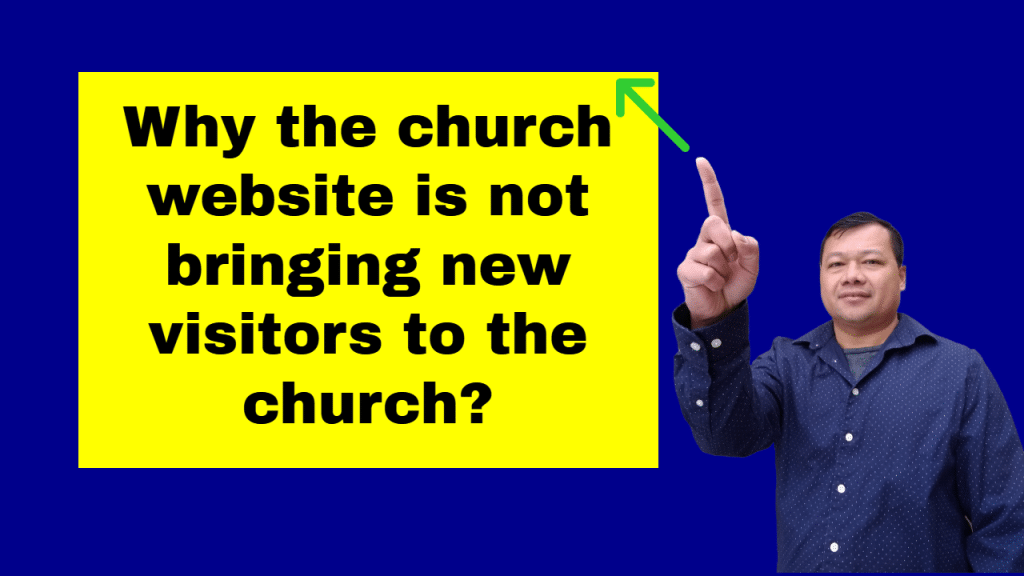In this article, I will outline 5 reasons why the church website is not bringing new visitors to the church and how to fix them.

First of all, when someone searches for a church, they are likely new to the area, looking for a new church, searching for a good place to fellowship, or seeking something new to experience. This audience is a great target audience already. When they visit your church website, they want to feel welcome and be able to see your mission, vision, and doctrine as a church. If they stay long enough to learn about your church and see opportunities for sermons and ministry, then you should have a call to action for them to leave their information and for you to follow up. However, if your website lacks information and only displays your phone number, visitors may not bother calling for additional information. Therefore, it is important to fix your website before hoping for more visitors from another website.
5 reasons why the church website is not bringing new visitors to the church and how to fix them.
1. The church website is outdated. When people visit your website and they see that the recent post/event/announcement is 2 years old, potential visitors may assume that most of the information is no longer accurate and look for another church website. An outdated church website can be a significant barrier to attracting and retaining visitors. Here are a few reasons why this may be the case. Outdated information: A website that has not been updated in a while may contain incorrect or outdated information, such as incorrect service times, upcoming events, or contact information. This can be confusing and frustrating for visitors who are looking for current and accurate information.
Poor user experience: An outdated website may have a dated design, poor navigation, and slow loading times, which can make it difficult for visitors to find the information they need and can lead to a poor user experience.
Limited functionality: An outdated website may not have the functionality to support modern features such as online donations, live streaming, or interactive features like discussion boards or chat.
Limited social media integration: An outdated website may not be integrated with social media platforms, such as Facebook, Instagram, or YouTube, which can make it difficult for visitors to stay connected with the church and its community.
2. The church website lacks important information. People who seek to visit a church expect to see detailed information such as the mission, vision, events, sermons and more. When a website lacks information, it can lead to a few problems:
Poor user experience: If a website does not provide enough information, it can be frustrating for users who are trying to find specific information. This can lead to a high bounce rate, as users will quickly leave the site.
Low search engine rankings: Search engines like Google use the content on a website to determine its relevance and value to users. A website with a lack of information may not be seen as relevant or valuable, which can lead to lower search engine rankings.
Limited functionality: A website that lacks information may not be able to fulfill its purpose, such as providing information about a product or service, or completing a particular action like a purchase.
Limited conversion rates: A website that lacks information may not be able to persuade visitors to take a desired action, such as making a purchase or filling out a contact form.
Limited brand trust: A website that lacks information may not be able to establish trust with visitors, which is important for building a relationship with customers.
Limited knowledge sharing: A website that lacks information may not be able to educate or inform visitors about a particular subject, which can limit the amount of knowledge that is shared with the target audience.
3. The church website is only viewable on desktop and not mobile responsive. Most people who search online use smartphones, so it is essential that the website is mobile responsive. Having a mobile-responsive website is important for a few reasons:
Mobile traffic: More and more people are using mobile devices to browse the internet, so it’s important to make sure your website is optimized for mobile users. If your website is not mobile-responsive, it will be difficult for mobile users to navigate and read the content on your site, which can lead to a poor user experience and a higher bounce rate.
Search engine optimization: Google and other search engines take into account the mobile-friendliness of a website when ranking it in search results. Having a mobile-responsive website can improve your search engine rankings and increase the visibility of your site to potential customers.
Increased conversion rates: A mobile-responsive website can make it easier for users to purchase products or complete other important actions on your site. Users are more likely to complete a purchase or take other desired actions when they can easily navigate and interact with your website on their mobile devices.
Cost-effective solution: Developing a separate mobile version of your website requires additional resources, both in terms of time and money. A mobile-responsive website, on the other hand, uses the same codebase and content as the desktop version and adapts to different screen sizes.
Better user experience: A mobile-responsive website can provide a better user experience for mobile users. With a mobile-responsive design, users can easily navigate through your website and find what they’re looking for, regardless of the device they’re using.
Overall, a mobile-responsive website is essential for providing a good user experience and reaching a wider audience, especially in today’s digital age where mobile usage is dominant.
4. The church website is insecure. When someone visits the website, it will show an “insecure” icon in the upper-left corner, indicating that the website needs an SSL (Secure Socket Layer) to show the locked icon. An SSL (Secure Socket Layer) certificate is used to establish a secure, encrypted connection between a web server and a web browser. This is important because it helps to protect sensitive information, such as login credentials and credit card numbers, from being intercepted by third parties. Additionally, an SSL certificate can also be used to verify the identity of a website, providing users with an additional layer of trust and security. In short, SSL certificates are necessary for any website that handles sensitive information and wants to establish trust with its users.
5. The church website is not optimized for search engines. When your website does not show up in Google, it is a major problem and needs to be fixed immediately to increase the chances of generating more visitors to the church. If your website is not showing up in Google search results, there are a few potential reasons why this might be the case. Some possible causes include:
Your website is not indexed by Google: Google needs to crawl your website and add it to its index in order for it to show up in search results. If your website is not indexed, you can submit your site to Google for indexing.
Your website has poor on-page SEO: If your website is not optimized for search engines, it may not rank well in search results. Make sure to include relevant keywords in your website’s content, meta tags, and URLs.
Your website has low-quality content: Google’s algorithm prioritizes high-quality content, so if your website’s content is not up to par, it may not rank well in search results.
Your website has backlink issues: Backlinks are links to your website from other sites. If your website has many low-quality or spammy backlinks, it can negatively impact your search engine rankings.
Your website has been penalized: If your website has been penalized by Google, it may not show up in search results. This can happen if your website is found to be in violation of Google’s Webmaster Guidelines.
Your website is new: It takes time for Google to crawl and index new websites, so if your site is new, it may not show up in search results yet.
It’s important to note that it might take some time for your website to show up in Google’s search results, even if you have done all the right things.
If your church is experiencing these issues right now, please feel free to leave your information. You can also check if your church website is optimized by visiting www.instantseo.me. We offer custom design for your church, and can redo your website, optimize it, and guide you on how to update your content, events, and more.
GET IN TOUCH
